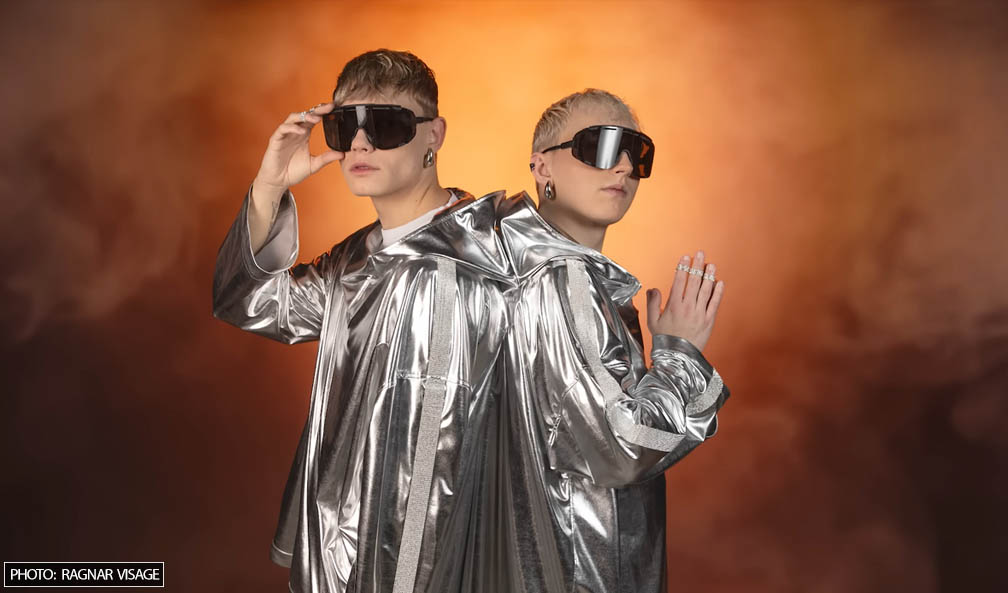
Iceland at Eurovision 2025: Icelandic national selection director, Rúnar Freyr Gíslason, responds to claims against Iceland’s Eurovision 2025 entry, saying they trust VÆB wrote the song themselves.
The saga continues: As an official investigation begins in Iceland regarding claims raised by creator Ofir Cohen, suspecting that the Icelandic duo VÆB plagiarized their song “Róa” from the hit “Hatunat HaShana,” which became popular in Eyal Golan and Itay Levy’s performance about seven years ago, a response now comes from the director of the Icelandic Eurovision national final, Rúnar Freyr Gíslason, who expresses his confidence that the duo wrote the song for the competition themselves and that all they are doing now is waiting for further developments in the case.
Official Response from Icelandic Broadcaster
Gíslason claimed that as of now, the issue has not been directly raised with the Icelandic national broadcaster RÚV, but he believes the rapper duo when they claim they wrote the song themselves and had never heard the Israeli hit until plagiarism claims arose. He adds that they are closely following the case, and that VÆB did not violate any rules, winning the national selection legitimately and legally, stating that as long as this doesn’t change, “everyone is calm.”
Optimism for Eurovision Participation
Regarding the possibility of the song being disqualified and not participating in the upcoming Eurovision contest to be held in Basel, Switzerland, Gíslason is optimistic that everything will go smoothly and that the duo will represent them at Eurovision 2025. According to him, similar cases where plagiarism accusations were raised have never led to a song’s disqualification in the competition, and such cases are only resolved in courts.
Potential Resolution
Gíslason mentions the possibility of a compromise agreement where creator Ofir Cohen could be compensated as one of the writers of the Icelandic Eurovision entry. He emphasizes that they are following the situation closely and trusting in the integrity of VÆB’s creative process.
According to the publication in “Israel Hayom“, Bakel Walden, chairman of the Eurovision Reference Group, stated that the matter is under the responsibility of the Icelandic national broadcaster, and that the European Broadcasting Union (EBU) has not yet discussed the issue. ACUM (Society of Authors, Composers and Music Publishers in Israel) confirmed to the newspaper that its Icelandic counterpart, STEF, has opened an investigation into the case. During the investigation, the Icelandic singers will not receive royalties for the song until the issue is resolved.
Listen to both songs:
View this post on Instagram
Legal Action and Official Response
N12’s culture reporter and editor, Noam Cohen, reports that the Israeli songwriter has sent a cease-and-desist letter through his lawyer. The letter was addressed to the European Broadcasting Union (EBU) and the official Icelandic Songwriters and Composers Association (ISAC), demanding the song’s disqualification from the upcoming competition.
In the letter, the songwriter claims that the song infringes on his rights due to the identical melody. They added: “Given the high profile of Eurovision and the global exposure it provides to participants, this is a particularly serious case. We request the EBU to immediately remove the song due to copyright infringement.”
Icelandic Response and Previous Incidents
The Icelandic duo denied the allegations about copying the Israeli song: “We have never heard this song in our lives. We don’t listen to Israeli music. We only listen to Icelandic rap, Icelandic pop, and Eminem,” they said in an interview with Icelandic media. Meanwhile, the national selection management also addressed the issue. The director of the local competition, Rúnar Freyr Gíslason, commented on the case, stating, “Some say that every real Eurovision song resembles another Eurovision song.”
Potential Outcomes and Precedents
While legal action is being pursued, it’s unlikely that the song will be disqualified. A compromise agreement may be reached, potentially adding the Israeli songwriter to the list of songwriters for the Icelandic Eurovision entry. This would be similar to the settlement reached between the songwriters of the Israeli song “Toy,” with which Netta Barzilai won Eurovision 2018, and Jack White of The White Stripes, who claimed that the Israeli song songwriters infringed on his rights due to similarities to “Seven Nation Army.”
Iceland in Eurovision 2025
“Róa” is the song to be performed by Væb, representing Iceland in the first semi-final of Eurovision 2025 in Basel, Switzerland. The song was written and composed by the duo, along with Ingi Þór Garðarsson. It is the songwriters’ first Eurovision entry and is performed in Icelandic.
The song describes the stages of building a boat from simple planks, preparing for a journey with suitable equipment, and sailing to distant destinations like the Faroe Islands and Greenland. Despite challenges and dangers, the song expresses optimism and determination to continue the journey, likening themselves to brave captains. The central message of the song is about facing challenges, seeking better places, and persevering through obstacles. The recurring chorus emphasizes the feeling of freedom and continuous movement across the waves.
Currently, Iceland ranks 34th in the betting odds for Eurovision 2025.
Source: mbl.is.
Eurovision 2025: This will be Iceland’s 37th participation in Eurovision. Iceland joined the competition in 1986 and achieved its best result in Eurovision 1999 and Eurovision 2009 after finishing second twice.

